Your Questions Answered!
By Dr. Mehmet Oz
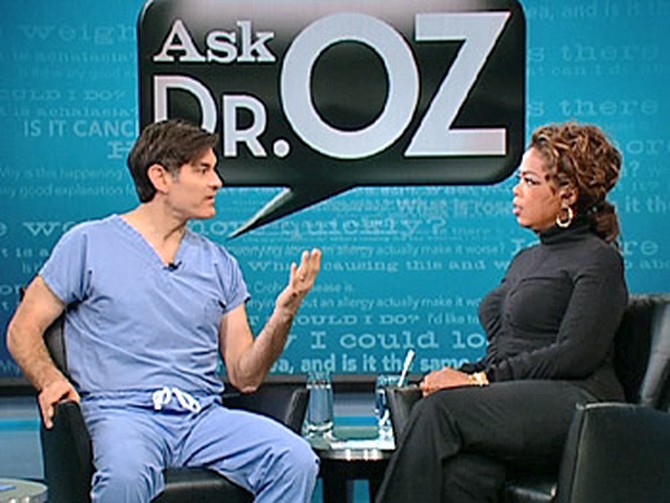
What is Rolfing? Is it something that could help ease muscle tension?
If you're plagued by muscle pain, Dr. Oz recommends a technique called Rolfing, which he describes as "even deeper than a deep-tissue massage."
This technique, which was developed by Dr. Ida Pauline Rolf, aims to separate bound-up connective tissues (or fascia), which link the muscles. "Rolfing literally releases the joints," Dr. Oz says. "When you talk to folks about the impact it has on them, a lot of them just stand taller. A lot is just freeing you up to live the way you're supposed to live."
If you're plagued by muscle pain, Dr. Oz recommends a technique called Rolfing, which he describes as "even deeper than a deep-tissue massage."
This technique, which was developed by Dr. Ida Pauline Rolf, aims to separate bound-up connective tissues (or fascia), which link the muscles. "Rolfing literally releases the joints," Dr. Oz says. "When you talk to folks about the impact it has on them, a lot of them just stand taller. A lot is just freeing you up to live the way you're supposed to live."
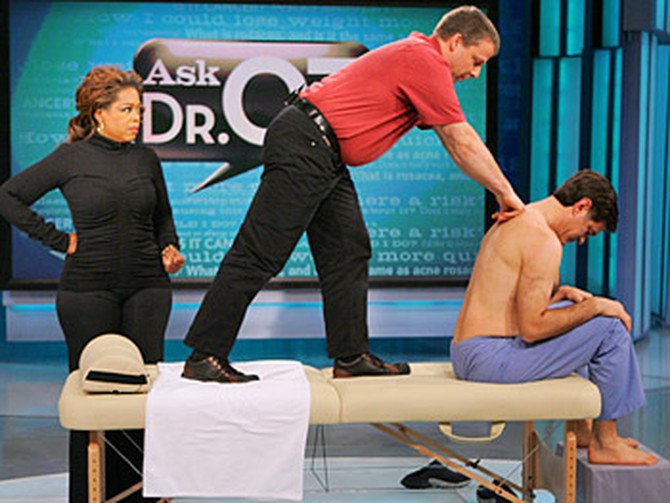
The last time Dr. Oz was on set, Oprah agreed to get acupuncture . Now, it's Dr. Oz's turn!
Dr. Oz volunteers to get Rolfed to demonstrate its medical benefits. Certified Rolfer Jonathan Martine says this massage method works with the body instead of on it. "What I'm looking at doing here is releasing the fascia, which is the wrapping around the muscles," he says.
The procedure may seem painful, but Jonathan says he works within the body's limits. "If I'm trying to force you into position to be upright, and you're not ready to be there, it's going to be challenging," he says.
You don't even have to strip down to have this procedure. "We work at a level of comfort for the client," Jonathan says. "I work with people in a bra and underwear or running shorts. I worked with a rancher from Nebraska that had his clothes on for most of the sessions."
Dr. Oz volunteers to get Rolfed to demonstrate its medical benefits. Certified Rolfer Jonathan Martine says this massage method works with the body instead of on it. "What I'm looking at doing here is releasing the fascia, which is the wrapping around the muscles," he says.
The procedure may seem painful, but Jonathan says he works within the body's limits. "If I'm trying to force you into position to be upright, and you're not ready to be there, it's going to be challenging," he says.
You don't even have to strip down to have this procedure. "We work at a level of comfort for the client," Jonathan says. "I work with people in a bra and underwear or running shorts. I worked with a rancher from Nebraska that had his clothes on for most of the sessions."

Is it safe to hold in gas for long periods of time?
Flatulate, fart, toot, poot…no matter what you call it, you can't avoid it. In fact, Dr. Oz says men and women pass the same amount of gas every day.
In one day, almost a half liter of gas escapes the body in little aliquots, he says. So even if you think you're holding it in, the built-up gas will be released while you sleep.
Holding in gas isn't dangerous to your health, but Dr. Oz says it can cause unnecessary stomach cramps and pain. "You shouldn't bother [holding it in]," he says. "Let it come out when it's supposed to come out. Be smart about it. Do it in a place that's airy enough that you're not going to hurt your family and friends."
Scared of causing a stink? Don't worry…Dr. Oz says keeping gas all bottled up won't make it smell worse. Blame the foul odor on the foods you eat. "Beans give you a lot of gas," Dr. Oz says. "But beans don't make gas that smells bad. Meat, eggs [and] cauliflower—the leftover from these foods have sulfur in them, and they form methane gas."
The more sulfur there is in your diet, the more likely you'll be blaming the dog.
Flatulate, fart, toot, poot…no matter what you call it, you can't avoid it. In fact, Dr. Oz says men and women pass the same amount of gas every day.
In one day, almost a half liter of gas escapes the body in little aliquots, he says. So even if you think you're holding it in, the built-up gas will be released while you sleep.
Holding in gas isn't dangerous to your health, but Dr. Oz says it can cause unnecessary stomach cramps and pain. "You shouldn't bother [holding it in]," he says. "Let it come out when it's supposed to come out. Be smart about it. Do it in a place that's airy enough that you're not going to hurt your family and friends."
Scared of causing a stink? Don't worry…Dr. Oz says keeping gas all bottled up won't make it smell worse. Blame the foul odor on the foods you eat. "Beans give you a lot of gas," Dr. Oz says. "But beans don't make gas that smells bad. Meat, eggs [and] cauliflower—the leftover from these foods have sulfur in them, and they form methane gas."
The more sulfur there is in your diet, the more likely you'll be blaming the dog.

Is vacation constipation normal? Does it hurt my body to hold in poop for so long?
Escaping to a sandy beach or traveling through Europe may seem like a relaxing way to spend your vacation, but there's one part of your body that may be on edge until you return home.
Many people complain of constipation when they travel. Dr. Oz says this common problem is known as "safe-toilet syndrome."
"What happens is you go out on the road, and you get into an environment that's not as safe," he says. "Humans, in order to go to the bathroom, have to allow their autonomic system—the autopilot of our body—to go into relax mode. It's the only way that you can go to the bathroom. … So when you leave the comfort of your home, you get into an uncomfortable situation where you just don't ever relax."
Two other factors can contribute to vacation constipation—lack of fiber in your diet and not drinking enough water. "That one-two punch really stops you up," he says. If you're traveling to another time zone, a confused body clock might also be to blame.
If you're experiencing chronic constipation, Dr. Oz says it could be a symptom of something more serious, like cancer or irritable bowel syndrome. "The one we fear the most is cancer, because sometimes cancer can block off your intestinal track and you can't go to the bathroom," he says.
"But the much bigger cause is something called irritable bowel syndrome. … If the gut doesn't speak to the brain correctly, then we have the syndrome called irritable bowel."
Escaping to a sandy beach or traveling through Europe may seem like a relaxing way to spend your vacation, but there's one part of your body that may be on edge until you return home.
Many people complain of constipation when they travel. Dr. Oz says this common problem is known as "safe-toilet syndrome."
"What happens is you go out on the road, and you get into an environment that's not as safe," he says. "Humans, in order to go to the bathroom, have to allow their autonomic system—the autopilot of our body—to go into relax mode. It's the only way that you can go to the bathroom. … So when you leave the comfort of your home, you get into an uncomfortable situation where you just don't ever relax."
Two other factors can contribute to vacation constipation—lack of fiber in your diet and not drinking enough water. "That one-two punch really stops you up," he says. If you're traveling to another time zone, a confused body clock might also be to blame.
If you're experiencing chronic constipation, Dr. Oz says it could be a symptom of something more serious, like cancer or irritable bowel syndrome. "The one we fear the most is cancer, because sometimes cancer can block off your intestinal track and you can't go to the bathroom," he says.
"But the much bigger cause is something called irritable bowel syndrome. … If the gut doesn't speak to the brain correctly, then we have the syndrome called irritable bowel."
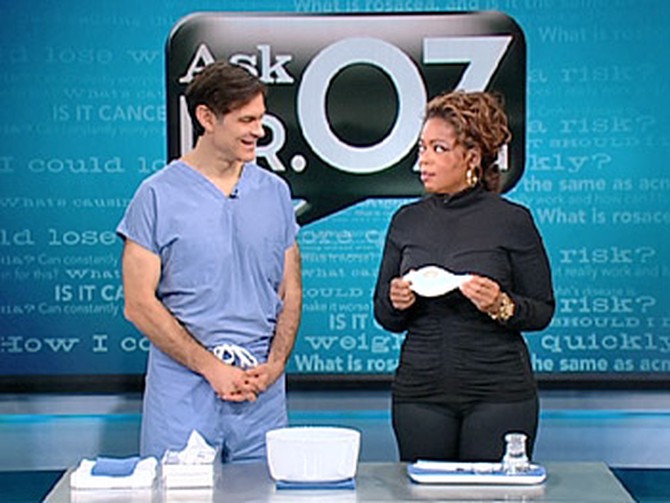
What is a neti pot? Can it help with allergies and sinus problems?
It may look like a watering can or a genie bottle, but a neti pot—or "nose bidet"—may actually be the answer to your sinus woes. For thousands of years, Dr. Oz says people have been using similar devices to wash out their noses.
By pouring warm water from the neti pot into your nose, you can stimulate your sinuses and help clear out mucus. If the fluid builds up in your sinuses and causes pressure, you will experience pain, Dr. Oz says. This condition is known as sinusitis—inflammation of the sinuses.
"A lot of folks that have allergies, who have sinusitis, that have conditions that we treat with medications are equally well treated by actually washing the areas of your body," he says. "When you think about it … you wash your underarms. You have bidets. Why wouldn't you wash a pretty important part of your body, your sinuses, in the same fashion?"
If your sinuses are working normally, they will clean themselves. "That's why you blow your nose," he says.
It may look like a watering can or a genie bottle, but a neti pot—or "nose bidet"—may actually be the answer to your sinus woes. For thousands of years, Dr. Oz says people have been using similar devices to wash out their noses.
By pouring warm water from the neti pot into your nose, you can stimulate your sinuses and help clear out mucus. If the fluid builds up in your sinuses and causes pressure, you will experience pain, Dr. Oz says. This condition is known as sinusitis—inflammation of the sinuses.
"A lot of folks that have allergies, who have sinusitis, that have conditions that we treat with medications are equally well treated by actually washing the areas of your body," he says. "When you think about it … you wash your underarms. You have bidets. Why wouldn't you wash a pretty important part of your body, your sinuses, in the same fashion?"
If your sinuses are working normally, they will clean themselves. "That's why you blow your nose," he says.

Before you try pouring water into your nostril, Dr. Oz offers some neti pot pointers. First, mix warm water with a quarter teaspoon of non-iodized salt.
"You never want to wash [human] tissue without having saltwater in them," he says. "Your own cells like it more."
Dr. Oz says washing out your sinuses with regular water can be irritating. Cold water may make you feel like you're drowning in a pool.
Amy, an audience member who suffers from sinusitis, demonstrates the proper way to use a neti pot. "I thought it would feel like drowning, but it feels good," she says.
It may look strange, but Dr. Oz says this treatment may be more effective than medication. "The [ear, nose and throat] doctors who are specialists in this area will often say this is a better treatment than a lot of the other drugs that we try to offer folks, because it mechanically cleans out the problem," he says.
What were Amy's long-term effects of using a neti pot for her allergies?
Neti pots are available at health food stores and most drug stores.
"You never want to wash [human] tissue without having saltwater in them," he says. "Your own cells like it more."
Dr. Oz says washing out your sinuses with regular water can be irritating. Cold water may make you feel like you're drowning in a pool.
Amy, an audience member who suffers from sinusitis, demonstrates the proper way to use a neti pot. "I thought it would feel like drowning, but it feels good," she says.
It may look strange, but Dr. Oz says this treatment may be more effective than medication. "The [ear, nose and throat] doctors who are specialists in this area will often say this is a better treatment than a lot of the other drugs that we try to offer folks, because it mechanically cleans out the problem," he says.
What were Amy's long-term effects of using a neti pot for her allergies?
Neti pots are available at health food stores and most drug stores.

After sex with my husband, parts of my body get numb, red and irritated. Could I be allergic to his sperm?
While the medical community once thought this wasn't possible, Dr. Oz says they have recently reconsidered. However, it's not her husband's sperm that she is most likely allergic to, but rather the proteins in his semen. "The allergy can sometimes cause a systemic response like hives and a feeling in your eyes and your mouth that you're not quite right, but a lot of times it will be very local," Dr. Oz says. "You'll get irritation around the va-jay-jay."
Dr. Oz says that the best way to cure this allergy is through safe sex. Simply using a condom should prevent the allergic reaction.
In some women, an allergy to semen could be a sign of something much more worrisome. "The woman has antibodies against the male sperm," Dr. Oz says. "They see the sperm as an invading army of bacteria, and they start to kill it." He says this can lead to future fertility difficulties.
While the medical community once thought this wasn't possible, Dr. Oz says they have recently reconsidered. However, it's not her husband's sperm that she is most likely allergic to, but rather the proteins in his semen. "The allergy can sometimes cause a systemic response like hives and a feeling in your eyes and your mouth that you're not quite right, but a lot of times it will be very local," Dr. Oz says. "You'll get irritation around the va-jay-jay."
Dr. Oz says that the best way to cure this allergy is through safe sex. Simply using a condom should prevent the allergic reaction.
In some women, an allergy to semen could be a sign of something much more worrisome. "The woman has antibodies against the male sperm," Dr. Oz says. "They see the sperm as an invading army of bacteria, and they start to kill it." He says this can lead to future fertility difficulties.
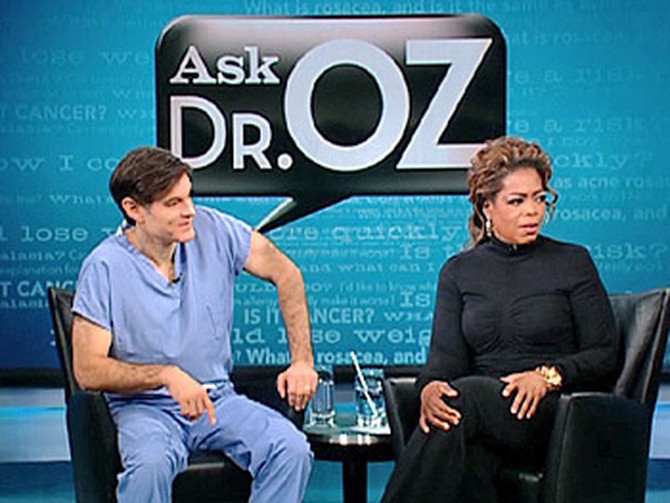
Occasionally, a liquid forms in my belly button that has a strange odor. Why does this happen and how can I prevent it from happening again?
If you find you've got a smelly belly, start contemplating your navel.
If you have an "outie," Dr. Oz says you could have a small hernia that's been there since your birth. Normally with an outie, there's no consequence and nothing needs to be done. But if it regularly becomes infected and there is a "creamy and constant" discharge, Dr. Oz says you should speak with your doctor.
"Remember your entire bowel system was connected to your mother through that one little hole," he says. "So if it doesn't heal all the way when you're born, you can have a little bit of tissue in there that will continue to accumulate fluid and it will push it out."
One thing you absolutely should not do is use rubbing alcohol to clean that wound…or any wound, for that matter. "When you have a wound of any kind in your body, you never want to put a solution in there that you wouldn't put in your eyes," Dr. Oz says. "What happens when you use alcohol is you kill 50 [bad] bacteria, but you kill 500 million of your own defender cells. You want to use solutions that your body likes so you help the good guys."
Instead of a harsh cleanser, Dr. Oz recommends using a salt solution like the one used for the neti pot: about a quarter-teaspoon of salt mixed with warm water.
If you find you've got a smelly belly, start contemplating your navel.
If you have an "outie," Dr. Oz says you could have a small hernia that's been there since your birth. Normally with an outie, there's no consequence and nothing needs to be done. But if it regularly becomes infected and there is a "creamy and constant" discharge, Dr. Oz says you should speak with your doctor.
"Remember your entire bowel system was connected to your mother through that one little hole," he says. "So if it doesn't heal all the way when you're born, you can have a little bit of tissue in there that will continue to accumulate fluid and it will push it out."
One thing you absolutely should not do is use rubbing alcohol to clean that wound…or any wound, for that matter. "When you have a wound of any kind in your body, you never want to put a solution in there that you wouldn't put in your eyes," Dr. Oz says. "What happens when you use alcohol is you kill 50 [bad] bacteria, but you kill 500 million of your own defender cells. You want to use solutions that your body likes so you help the good guys."
Instead of a harsh cleanser, Dr. Oz recommends using a salt solution like the one used for the neti pot: about a quarter-teaspoon of salt mixed with warm water.

Am I doing any damage to my hearing by cranking up the music in my earbuds?
The good thing about personal music players and their headphones—especially those ubiquitous white earbuds—is that you can groove in the gym or rock out at the market.
The bad thing about them, Dr. Oz says, is that they will almost certainly damage your hearing if you listen for too long or crank up the volume too high. "If you're exposed to a noise as loud as a city street for more than an hour at a time, it's dangerous," Dr. Oz says. "Think about this: When you wear your earphones, you [could] generate noise that's loud enough to drown out the city street."
Prolonged exposure to loud noises—including piped-in music—shakes up the bones in the middle of your ear and overstimulates the tiny hairs in your ear. Dr. Oz compares these overstimulated hairs to the bristles on a worn-out toothbrush. That loud music can lead to hearing loss and tinnitus—a permanent ringing in the ears. "Any time you hear a little ringing in your ears," Dr. Oz says, "you had it turned up too loud." To be safe, he says you shouldn't ever turn the volume up to more than 70 percent of the maximum.
Loud noise may not only leave a ringing in your ears—it could take years off your life. Dr. Oz says a recent study in Germany suggests there may be a connection between loud noises and heart problems. "Women had a 50 percent increased chance of having a heart attack if they were exposed to a lot of noise all day long, especially at home," he says. Though Dr. Oz says the reasoning behind this isn't known for sure, researchers believe that the added stress of being around loud noises creates more heart-damaging anxiety. "Although you don't realize it, your body does. And it doesn't react to it on the right way."
The good thing about personal music players and their headphones—especially those ubiquitous white earbuds—is that you can groove in the gym or rock out at the market.
The bad thing about them, Dr. Oz says, is that they will almost certainly damage your hearing if you listen for too long or crank up the volume too high. "If you're exposed to a noise as loud as a city street for more than an hour at a time, it's dangerous," Dr. Oz says. "Think about this: When you wear your earphones, you [could] generate noise that's loud enough to drown out the city street."
Prolonged exposure to loud noises—including piped-in music—shakes up the bones in the middle of your ear and overstimulates the tiny hairs in your ear. Dr. Oz compares these overstimulated hairs to the bristles on a worn-out toothbrush. That loud music can lead to hearing loss and tinnitus—a permanent ringing in the ears. "Any time you hear a little ringing in your ears," Dr. Oz says, "you had it turned up too loud." To be safe, he says you shouldn't ever turn the volume up to more than 70 percent of the maximum.
Loud noise may not only leave a ringing in your ears—it could take years off your life. Dr. Oz says a recent study in Germany suggests there may be a connection between loud noises and heart problems. "Women had a 50 percent increased chance of having a heart attack if they were exposed to a lot of noise all day long, especially at home," he says. Though Dr. Oz says the reasoning behind this isn't known for sure, researchers believe that the added stress of being around loud noises creates more heart-damaging anxiety. "Although you don't realize it, your body does. And it doesn't react to it on the right way."
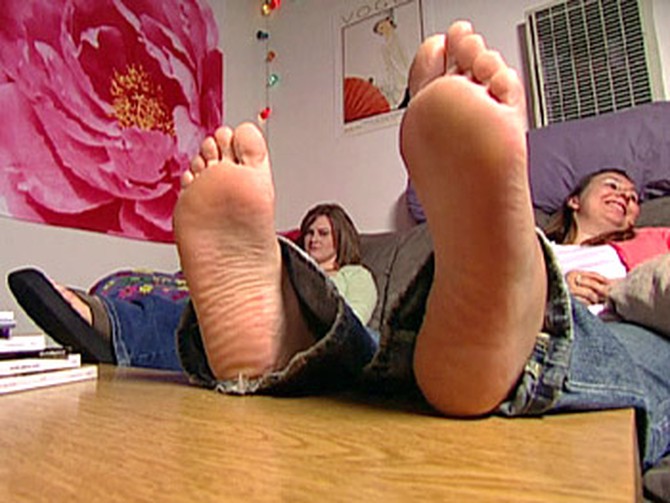
I've tried everything from repeated washing to open-toed shoes, but the smell is still horrible. What can I do about my stinky feet?
It's no surprise that so many people's feet smell. After all, Dr. Oz says, there are a quarter-million sweat glands on your feet. "You can generate about a half a liter of sweat from your foot in a day. It really does make a lot of juice."
But that sweaty foot is not the direct cause of the stink. After all, sweat is sterile. That pungent smell is actually caused by fungus or bacteria—such as athlete's foot. "Take your shoes off and look to see if you've got a little bit of a pitting on the bottom of your foot, on the sole. The pitting is … almost like little pinholes in the bottom of your foot, and it usually is a little bit white. That's an example of a fungus infection," Dr. Oz says.
So how can you get rid of the bacteria? Dr. Oz's remedy has a cure in the bag. Brew up some mild iced tea and put your feet in it for about 30 minutes a day for a week. "The tannic acid in the tea will actually tan your foot a little bit, which will dry it out," he says. "That's helpful in reducing the amount of sweat, and the odor as well."
Did Dr. Oz's tea trick reduce the stinkiness?
It's no surprise that so many people's feet smell. After all, Dr. Oz says, there are a quarter-million sweat glands on your feet. "You can generate about a half a liter of sweat from your foot in a day. It really does make a lot of juice."
But that sweaty foot is not the direct cause of the stink. After all, sweat is sterile. That pungent smell is actually caused by fungus or bacteria—such as athlete's foot. "Take your shoes off and look to see if you've got a little bit of a pitting on the bottom of your foot, on the sole. The pitting is … almost like little pinholes in the bottom of your foot, and it usually is a little bit white. That's an example of a fungus infection," Dr. Oz says.
So how can you get rid of the bacteria? Dr. Oz's remedy has a cure in the bag. Brew up some mild iced tea and put your feet in it for about 30 minutes a day for a week. "The tannic acid in the tea will actually tan your foot a little bit, which will dry it out," he says. "That's helpful in reducing the amount of sweat, and the odor as well."
Did Dr. Oz's tea trick reduce the stinkiness?

Is talking on my cell phone a lot bad for my health?
No one knows for sure what the long-term effects of cell phones on brain cells will be. "But my personal belief, based on some data that shows that brain cells are affected by the cell phone—if you look at the brain cells on the right side of your brain versus the left side, when you're listening with the cell phone on the right side, they're a little different—we may actually find some problems down the road," Dr. Oz says.
What about cordless cell phone receivers? While these do reduce the amount of energy from the cell phone that reaches your head, their effects are also unknown. "They're probably beneficial, but they're receivers and so they might receive other energy from other places as well. We're not quite sure on those as yet," Dr. Oz says. "But I wouldn't throw my cell phone away. I have one, but I think for a lot of us we ought to think at least about how much we're on the cell phone."
Instead, Dr. Oz says the safest solution is using the speaker phone option. "The reason for that is the distance that you hold the phone away will cut the amount of energy [reaching your brain] by a quarter. So it's a lot if you can pull it farther from your head." Or, even better, he says to stick to the land line if you can.
No one knows for sure what the long-term effects of cell phones on brain cells will be. "But my personal belief, based on some data that shows that brain cells are affected by the cell phone—if you look at the brain cells on the right side of your brain versus the left side, when you're listening with the cell phone on the right side, they're a little different—we may actually find some problems down the road," Dr. Oz says.
What about cordless cell phone receivers? While these do reduce the amount of energy from the cell phone that reaches your head, their effects are also unknown. "They're probably beneficial, but they're receivers and so they might receive other energy from other places as well. We're not quite sure on those as yet," Dr. Oz says. "But I wouldn't throw my cell phone away. I have one, but I think for a lot of us we ought to think at least about how much we're on the cell phone."
Instead, Dr. Oz says the safest solution is using the speaker phone option. "The reason for that is the distance that you hold the phone away will cut the amount of energy [reaching your brain] by a quarter. So it's a lot if you can pull it farther from your head." Or, even better, he says to stick to the land line if you can.

When I get out of the shower, I'm sweating within minutes—even in an air-conditioned room. Why do I sweat so much?
Dr. Oz says there are at least three things that could be causing so much sweat. "You have to make sure your thyroid gland is normal," he says. "If your thyroid is working overtime, it will make you sweat a little bit." Dr. Oz says that thyroid issues are the most common hormonal problem in America. If you are feeling a bit off, your doctor can check it with a simple blood test.
Another cause of excessive sweat could be the presence of toxins—such as mercury—in your body. That sweat is your body's way of ridding itself of the toxins.
The third possibility? High blood pressure. If you do have high blood pressure, Dr. Oz says the danger lies in more than what an antiperspirant can cure.
While optimal blood pressure is 115 over 75, Dr. Oz says the average American's blood pressure is 130 over 85. "And what happens to the average American? We die of a heart attack," Dr. Oz says. "You don't want to be average, you want to be optimal. You want to do the right thing.
"Do you know why African-Americans have high blood pressure?" Dr. Oz asks Oprah.
"The reason why African-Americans have higher blood pressure, Dr. Oz, is because during the Middle Passage [when Africans were taken as slaves to America], the African-Americans who survived were those who could hold more salt into their body," Oprah says. "And those who didn't survive were the ones who couldn't hold more salt into their body."
"I'm off the show, you don't need me anymore—that's perfect!" Dr. Oz says.
Dr. Oz says there are at least three things that could be causing so much sweat. "You have to make sure your thyroid gland is normal," he says. "If your thyroid is working overtime, it will make you sweat a little bit." Dr. Oz says that thyroid issues are the most common hormonal problem in America. If you are feeling a bit off, your doctor can check it with a simple blood test.
Another cause of excessive sweat could be the presence of toxins—such as mercury—in your body. That sweat is your body's way of ridding itself of the toxins.
The third possibility? High blood pressure. If you do have high blood pressure, Dr. Oz says the danger lies in more than what an antiperspirant can cure.
While optimal blood pressure is 115 over 75, Dr. Oz says the average American's blood pressure is 130 over 85. "And what happens to the average American? We die of a heart attack," Dr. Oz says. "You don't want to be average, you want to be optimal. You want to do the right thing.
"Do you know why African-Americans have high blood pressure?" Dr. Oz asks Oprah.
"The reason why African-Americans have higher blood pressure, Dr. Oz, is because during the Middle Passage [when Africans were taken as slaves to America], the African-Americans who survived were those who could hold more salt into their body," Oprah says. "And those who didn't survive were the ones who couldn't hold more salt into their body."
"I'm off the show, you don't need me anymore—that's perfect!" Dr. Oz says.
Published 01/01/2006

